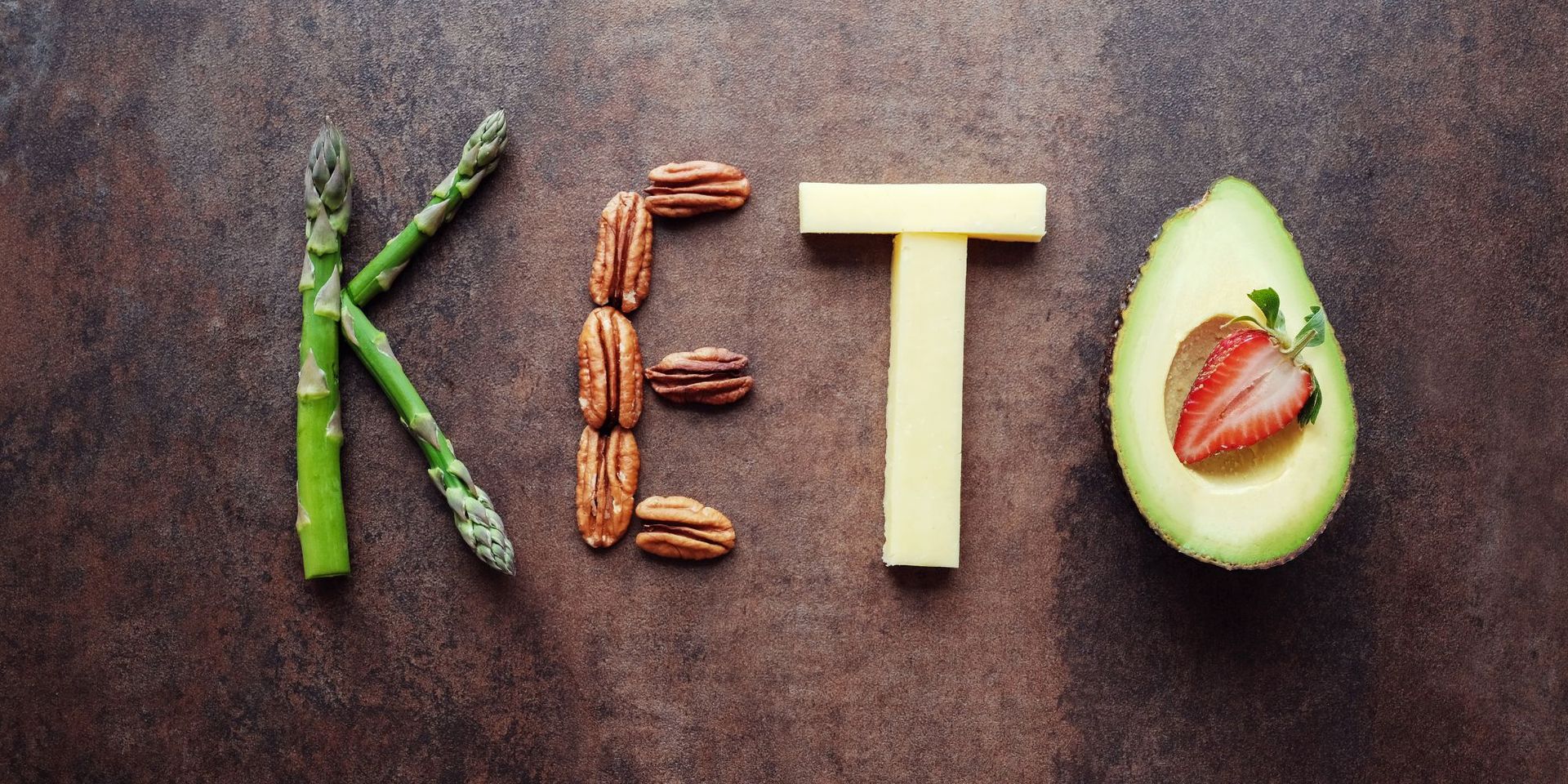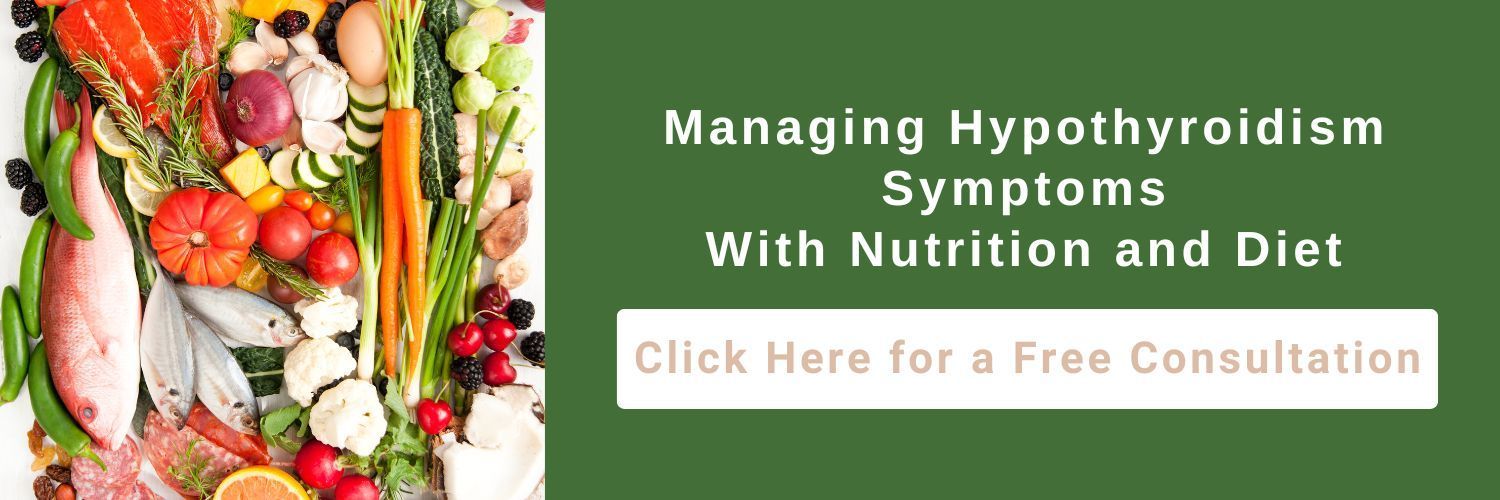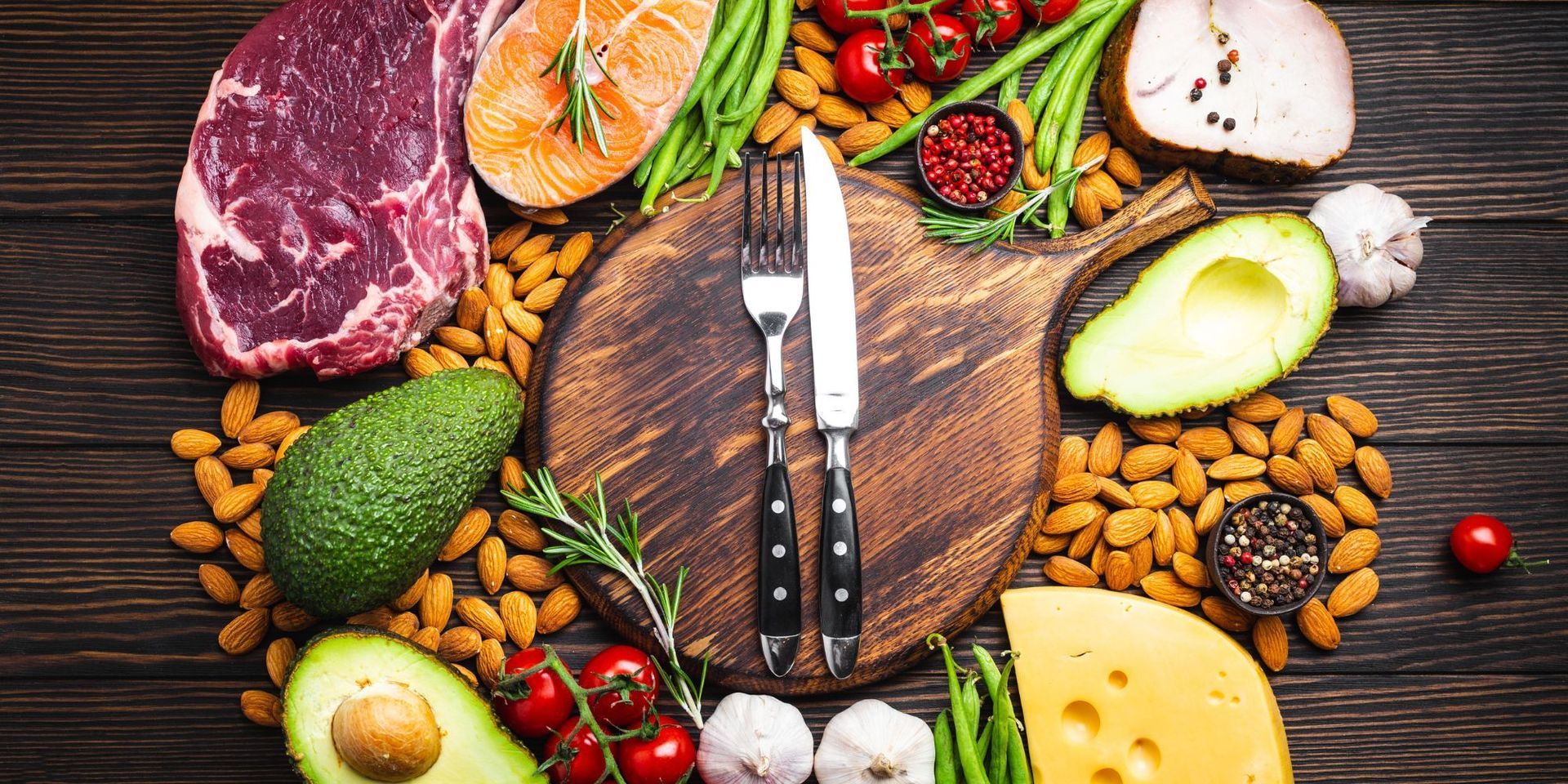Exploring the Effects of a Keto Diet on Hypothyroidism
"The content below is not intended to be a substitute for professional medical advice, diagnosis, or treatment. Always seek the advice of your physician or other qualified health provider with any questions you may have regarding a medical condition."
It feels like you’ve seen the keto diet everywhere.
Grocery stores line their shelves with bread, noodles, and cereal boxes that scream keto on their front labels. Celebrities flaunt the effect of their keto diet plans in magazines and through social media.
Your friends are giving it a try. But you’re different — you struggle with thyroid issues, and you wonder, is a keto diet safe for hypothyroidism?
Keep reading as we unearth the best diet for hypothyroidism and review the reasons why keto might not be the best fad diet for you.
Table of Contents
What Is Keto?
The ketogenic diet (often referred to as keto) is an eating pattern that includes high amounts of fats, low to moderate amounts of protein, and very little carbohydrates.
It was first used to treat epilepsy in 1921 to reduce seizure activity. The keto diet has been widely studied as a potential treatment for various conditions since the 1970s. In recent years, keto has continued to grow in popularity, particularly as a weight loss intervention.
The goal of keto is to reach ketosis, which causes your body to use fat as its main fuel, burning fat faster and leading to weight loss quickly.
There are several variations to the ketogenic diet, but all share a common objective — restriction of
carbohydrate intake.
Foods To Eat While on Keto
Keto-friendly pantries and fridges boast plenty of animal meat, dairy, eggs, nuts, oils, and a handful of veggies that typically grow above ground.
Here are some of the foods you may indulge in on a keto diet:
- Meat: Chicken, pork, steak, ground beef, lamb, bacon, turkey, and ham
- Fatty seafood: Salmon, snapper, tuna, halibut, cod, trout, catfish, scallops
- Shellfish: Crab, clams, oysters, lobster, mussels
- Fats and oils: Eggs, avocados, butter, coconut oil, olive oil, ghee, lard, avocado oil, and mayonnaise
- High-fat dairy: Heavy cream, soft and hard cheeses, cream cheese, and sour cream
- Nuts: Almonds, peanuts, macadamia nuts, pecans, hazelnuts, walnuts, and nut butters that aren't sweetened
- Vegetables: Cauliflower, cabbage, broccoli, zucchini, green beans, peppers, eggplants, tomatoes, asparagus, cucumber, onion, mushroom, spinach, lettuce, and olives
- Berries: Blueberries, blackberries, and raspberries in moderation
- Beverages: Unsweetened coffee and tea
Foods To Avoid
Brace yourself for mild disappointment, as some of your favorite foods might be included on this “no-go” list.:
- Most fruits: Apples, bananas, oranges, grapes, watermelon, peaches, melon, pineapple, cherries, pears, lemons, limes, grapefruits, plums, and mango
- Vegetables: Corn, potatoes, yams, parsnips, peas, beets, sweet potatoes, carrots, and butternut squash
- Most grains: Wheat, rice, rye, oats, corn, quinoa, barley, millet, bulgur, amaranth, buckwheat, and sprouted grains
- Starches: Bread, bagels, cereal, pasta, rice, corn, oatmeal, crackers, pizza, popcorn, granola, muesli, and flour
- Legumes: Black beans, kidney beans, pinto beans, navy beans, soybeans, peas, chickpeas, and lentils
- A selection of cooking oils: Canola oil, soybean oil, grapeseed oil, peanut oil, sesame oil, and sunflower oil
- Real sweeteners and sugar: Cane sugar, honey, maple syrup, agave nectar, Splenda, aspartame, saccharin, and corn syrup
- Sweet treats: Candy, chocolate, cake, pastries, tarts, pies, ice cream, cookies, pudding, and custard
- Bottled condiments: Ketchup, BBQ sauce, tomato sauce, salad dressings and hot sauces that contain added sugar
- Alcohol: Beer, cider, sweet wines, and sweetened alcoholic drinks
Is Keto Good for Hypothyroidism?
Food intake alone cannot cure hypothyroidism.
But symptoms may be minimized and thyroid function restored if the right combination of medication and nutrients are used together.
A low-carb diet may be beneficial for those battling hypothyroidism, as it might:
- Help with weight loss
- Improve heart health
- Improve blood sugar
But is the keto diet good for someone with hypothyroidism?
While the keto diet is beneficial for people with many medical conditions, including epilepsy or insulin sensitivity, it’s generally not recommended for people with underactive thyroids.
If you’re looking for a natural treatment for hypothyroidism, HealthierU can provide you with the nourishment and guidance you crave.
Dr. Sergi takes the time to get to know you, your body, and foods that react positively and negatively to it. Request a nutrition consultation today.
4 Reasons To Avoid Keto if You Have Hypothyroidism
When considering if a keto diet is good for hypothyroidism, it’s essential to understand how the thyroid works.
Your thyroid is an important endocrine gland that makes and releases hormones. Its main function is to control your metabolism, or how your body uses energy.
Hypothyroidism happens when your thyroid doesn't produce and release enough thyroid hormones.
Someone with hypothyroidism might consider steering clear of the keto diet for many reasons, including:
- Decreased thyroid hormone production
- Increased inflammation
- Potential micronutrient deficiencies
- Elevated cortisol levels
#1: Decreased Thyroid Hormone Production
Keto emphasizes consuming less than 20-50 grams of carbs per day — the same as less than 10% of your total energy intake.
Your body breaks down carbohydrates into glucose.
Thyroid hormones are needed to maintain and regulate your energy metabolism, and the glucose we get from carbohydrates is essential to produce thyroid hormones.
Glucose and your thyroid hormones are in a constant dance working together, both necessary and relying on the other to function properly.
The main regulation hormone, Thyroid Stimulating Hormone (TSH), is produced by the pituitary gland and is partly made up of glucose molecules. The thyroid gland is controlled by TSH, which requires glucose to release thyroid hormones (T4 and T3) necessary for metabolism.
The intake of carbohydrates directly influences the amount of T3 converted from the T4 hormone. When carb intake is drastically reduced as the keto diet requires, the conversion of T3 from T4 declines.
If you struggle with hypothyroidism, this is crucial information, as T3 is the active thyroid hormone that you need to increase.
Hypothyroidism has been linked to decreased
insulin sensitivity which may also affect your ability to convert T4 to T3 hormone. When insulin levels are too low, it may prohibit the liver’s ability to convert T4 to T3, reducing the availability of usable thyroid hormone in the body and potentially influencing your body’s metabolism.
#2: Increased Inflammation
Research has shown that prolonged ketosis can force the body to accumulate acid, which may encourage inflammation.
Many people with thyroid diseases already suffer from chronic inflammation, especially those suffering from these two thyroid conditions caused by autoimmune processes:
- Hashimoto’s disease: The immune system attacks the thyroid's healthy tissue, producing antibodies that damage the gland and cause inflammation.
- Grave’s disease: The only kind of hyperthyroidism that is associated with inflammation of the eyes, swelling of the tissues around the eyes, and bulging of the eyes.
Reducing possible sources of inflammation and ensuring a healthy gut is vital to help alleviate symptoms associated with hypothyroidism. Adding inflammation on top of inflammation may only worsen the symptoms.
#3: Potential Micronutrient Deficiencies
Micronutrients are beneficial antioxidants that may help combat thyroid disease.
Micronutrients:
- Build up anti-inflammatory profiles
- Reduce thyroid autoantibodies and body fat
- Improve thyroid function
Diets that restrict carbohydrates, like keto, may profoundly affect the quality of your diet, especially when micronutrients become limited.
Eliminating fruits, vegetables, whole grains, and legumes while increasing consumption of animal products may result in a lack of:
- Vitamins
- Minerals
- Fiber
- Phytochemicals
Low-carbohydrate diets are often lacking:
- Thiamin
- Folate
- Vitamin A
- Vitamin E
- Vitamin B6
- Vitamin B12
- Vitamin K
- Calcium
- Magnesium
- Iron
- Potassium
Nutritional guidance is of monumental importance to reduce the risk of thyroid disease and to manage it when it arises. HealthierU will customize a plan, permanently correcting your health concern through:
- Nutritional support
- Lifestyle guidance
- Supplementation
It’s time to start living your most nourished life, schedule a free consultation today.
#4: Elevated Cortisol Levels
When you feel stressed, a steroid hormone called cortisol is produced. If you experience chronic stress it may lead to elevated cortisol levels, causing havoc on your thyroid.
Elevated cortisol levels may worsen the symptoms of your hypothyroidism by:
- Suppressing the hypothalamic-pituitary-adrenal (HPA) axis: The HPA axis connects stress to physiological responses and serves as a communication system between the hypothalamus, pituitary, and adrenal glands. Increased activity of the HPA axis causes dysfunction that may result in decreased TSH, T4, and T3 production.
- Decreasing cellular sensitivity to thyroid hormones and reducing the absorption of thyroid hormones: Receptors for thyroid hormones are located in tissues throughout your entire body. It is where thyroid hormones are absorbed to be used. Increased cortisol can shift the thyroid into a more inactive state.
- Decreasing the conversion of T4 to T3: The inactive form of thyroid hormone (T4) must be converted to the active form (T3) before it can be used by cells and organs. Limited conversion of T4 to T3 may lead to symptoms of hypothyroidism such as:
- Fatigue
- Weight gain
- Poor concentration
- Constipation
- Decreased heart rate
- Depression
What Is the Best Diet for Hypothyroidism?
Just like mom always told you, “Eat your veggies!”
The best diet for hypothyroidism consists of vegetables, fruits, proteins, healthy fats, and yes — even a moderately recommended amount of carbohydrates. Thyroid health superfoods like the ones listed below are a surefire way to make mom proud and keep you feeling healthy.
What To Consume if You Have Hypothyroidism
Treating hypothyroidism with
diet may play an instrumental role in your thyroid health. Some foods may contribute to healthy thyroid function because they contain important nutrients such as selenium, zinc, and iodine.
Selenium
Selenium is an all-important mineral that helps protect the thyroid from damage caused by oxidative stress. Boosting your selenium levels with these foods may help reduce thyroid peroxidase antibodies (TPO) and the severity of your hypothyroidism symptoms:
- Brazil nuts
- Tuna
- Ham
- Sardines
- Eggs
- Bananas
- Legumes
- Sunflower seeds
- Oatmeal
- Spinach
- Cottage cheese
- Brown rice
Zinc
Zinc is a crucial mineral needed for thyroid hormone production and thyroid function. Scientific evidence shows that zinc plays a key role in the metabolism of thyroid hormones, facilitates the metabolism of lipids and glucose, and regulates metabolic adaptations.
Food sources of zinc include:
- Meat: Beef, lamb, and pork
- Shellfish: Shrimp, oysters, and crab
- Legumes
- Pumpkin seeds
- Nuts: Pine nuts, cashews, and almonds
- Yogurt, milk, and cheese
- Eggs
- Fortified cereal
Iodine
Iodine is an essential mineral that is necessary to make thyroid hormones. Research indicates that an iodine deficiency can lead to hypothyroidism and an increased risk of thyroid cancer.
Foods that are rich in iodine include:
- Dairy (milk, cheese, and yogurt)
- Iodized salt
- Saltwater fish (cod, canned tuna, oysters, and shrimp)
- Eggs
- Seaweed
- Prunes
- Lima beans
What To Avoid If You Have Hypothyroidism
Some foods contain nutrients that may aggravate thyroid health and hypothyroidism symptoms. If you avoid or limit these foods, it may benefit your thyroid and your body as a whole.
Soy
Soy comes from the soybean, a legume native to East Asia, and can be processed in many ways, including:
- Soy protein
- Soy milk
- Soy fiber
Soy products contain goitrogens, which are naturally-occurring chemicals that can disrupt thyroid function. It’s been observed that isoflavones in soy inhibit the enzyme TPO (essential for the synthesis of T3 and T4) which may further aggravate hypothyroidism.
One study evaluated the effect of soy on 60 patients with subclinical hypothyroidism, finding that the patients who consumed a high dosage of soy supplements were three times more likely to progress to overt hypothyroidism.
It may benefit your thyroid to avoid foods that contain any of these soy ingredients:
- Miso
- Edamame
- Natto
- Tamari
- Tempeh
- Soy sauce
- Tofu
- Soy sprouts
- Soy milk
- Soy yogurt
- Shoyu sauce
- Soy cheese
- Hydrolyzed soy protein
- Soy nuts
- Soy flour
Other Goitrogens
Other goitrogens are found in cruciferous vegetables and may interfere with thyroid hormone production as well. People with hypothyroidism may want to avoid eating large amounts of:
- Cabbage
- Kale
- Brussel sprouts
- Bok choy
- Arugula
- Cauliflower
- Turnips
Foods that contain goitrogens may disrupt thyroid function by blocking iodine from entering the thyroid gland.
However, these cruciferous veggies are loaded with fiber, vitamins, and minerals. These superfoods are an ideal addition to your daily nutrient intake.
But are these veggies considered to be the best diet for hypothyroidism?
Here's what you can do to minimize the risk of negative effects of other goitrogens:
- Eat in moderation: Avoid consuming large quantities of goitrogenic foods.
- Cook goitrogenic vegetables: Steaming, cooking, or fermentation can reduce the levels of goitrogens.
- Increase iodine and selenium intake: Getting enough iodine and selenium can help reduce the effects of goitrogens.
Gluten
Gluten is the name for proteins found in wheat, rye, barley, and triticale (a cross between wheat and rye).
Some research on hypothyroidism and Hashimoto's thyroiditis indicates individuals may find relief by eliminating gluten. Other studies conclude that gluten may not need to be entirely eliminated for optimal thyroid health.
Although there is conflicting evidence when it comes to determining whether going gluten-free is necessary for everyone with thyroid issues, the idea is to avoid a food considered by some to be pro-inflammatory.
Foods that contain gluten can be surprising and difficult to avoid, but carefully reading labels can help. Some common foods that contain gluten include:
- Bread
- Baked goods: muffins, cookies, pancakes, waffles, cake, and cupcakes
- Pasta
- Processed foods: chips, crackers, and snacks
- Cereal
- Sauces
- Soups
- Salad dressings
- Beer
- Malt
- Food coloring
How HealthierU May Help You Safely Use Nutrition To Manage Your Hypothyroidism
When determining if a keto diet is good for hypothyroidism, it’s critical to consult with a nutrition professional to determine whether it’s safe and appropriate for your hypothyroidism.
HealthierU specializes in women’s health and wellness. Dr. Sergi works diligently to identify and permanently alleviate your health-related symptoms using holistic and natural remedies.
These symptoms are your body’s way of telling you what it needs.
HealthierU will uncover the cause of your hypothyroidism and develop an action plan to help you feel better, eliminate your symptoms, and nourish your body back to health.
Be prepared to feel empowered by knowing your body and what it needs to thrive — request a nutrition consultation today!






